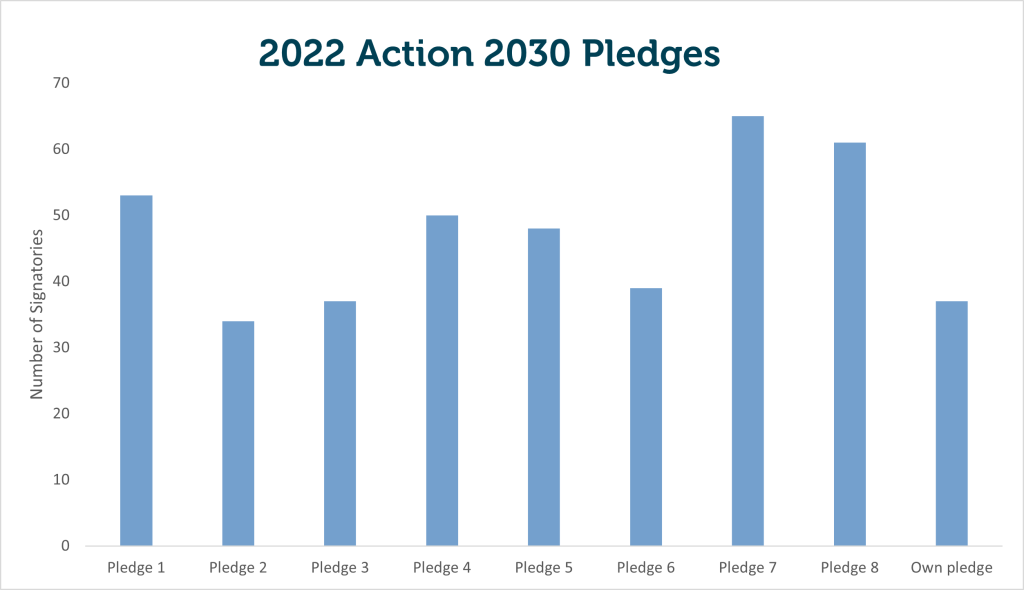The graph below shows the number of pledges we have received to date* from members, non-members and the CIEEM Secretariat as part of our 2022 member pledge campaign which aims to encourage action to address both the climate emergency and biodiversity crisis. A full list of the individuals who have signed up to each pledge can be found at the link below.

*This graph is updated regularly. Last update: 25 October 2022
Key:
Pledge 1: Record a baseline carbon footprint and develop a Carbon Reduction Plan to reach net zero by 2030, either as an individual/household or working with my organisation/team.
Pledge 2: Develop a scheme, with targets and a timescale, to increase sustainable transport use for work or encourage my employer to develop a scheme.
Pledge 3: Support carbon reduction/certified offsetting projects that utilise the full suite of carbon-rich habitats, created and restored in areas that are suited to their edaphic and climatic requirements and which simultaneously restore biodiversity. Record the hectares of which habitat you have supported. How many tonnes of carbon per hectare, per year is this expected to sequester?
Pledge 4: Ensure when creating or restoring habitats that I/my team minimise carbon losses and maximise carbon gains whilst delivering biodiversity benefits. Record the hectares of different habitats I have supported.
Pledge 5: Ensure when creating or restoring diverse habitats that other ecosystem services benefit as far as possible. Record effective outcomes in terms of hectares and specific ecosystem services, for example by using an Environmental Net Gain or natural capital approach.
Pledge 6: Create a waste and resource use reduction plan, with targets and a timescale, for myself or in collaboration with my organisation to reduce the volume of waste to landfill and water/energy use.
Pledge 7: Work with stakeholders and others to develop ideas and recognise strengths in their areas of influence, to encourage them to take action to protect/enhance biodiversity, reduce greenhouse gas emissions and positively benefit wider ecosystem services.
Pledge 8: Undertake a local project/action to raise the profile of the inter-related nature of the climate emergency and biodiversity crisis, for example by engaging with your MP/Local Authority, or supporting a local nature partnership.
CIEEM Secretariat Team Pledges
The CIEEM membership team pledges to reduce the impact of our member communications, whether digital or hard copy, by printing less, sending less and switching to digital options where practicable.
The CIEEM Office, Finance & Volunteering Team will be looking at ways to reduce the carbon impact of our website. We have recently commissioned a review of how we might do this and will now look to implement recommendations.
The CIEEM Professional Development team pledge to reduce the amount of paper and printing for events
- Training courses – previously for an in-person training course, the trainer would print out a paper feedback form which delegates would fill in at the end of the training session and hand back to the trainer. The trainer would then post the forms and a cover sheet to CIEEM. Going forwards, to reduce the printing and use of paper, the trainer will be sent a QR code that delegates can then scan at the end of the course to fill in the form. If the QR code doesn’t work eg no internet signal on site, then as a backup, we will email all the delegates the link so that they can fill in when back home/in office. This will help save lots of printing for trainer and save paper and postage. It will also streamline this part of the training programme admin process and bring this into a similar process that we already adopted for our online training courses.
- Conferences – for our conferences, we have already started to print fewer conference booklets for delegates to use on the day. Going forwards, we will be producing digital booklets (pdfs) for all conferences and also utilise the Cvent app for our in-person conferences. This will be implemented immediately and save paper and printing for future conferences.
- The Professional Development team are looking at how we can make our events more sustainable. As part of this we will be developing our own Sustainable Events Policy that we will share with the rest of the CIEEM Secretariat.
